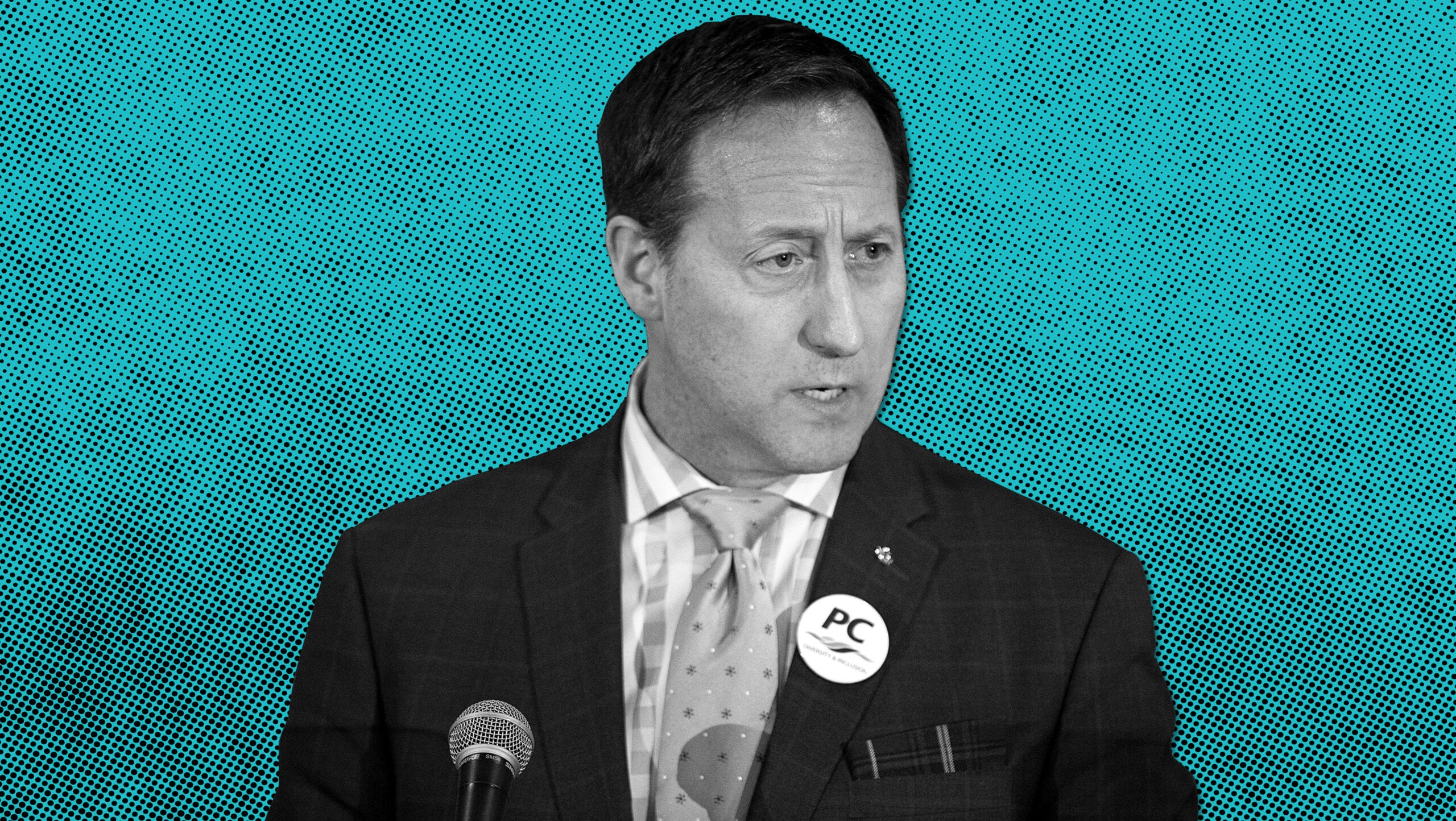Peter MacKay entered the Conservative leadership race in January with a proclamation: He’d march in Toronto’s Pride parade, which was then slated the same weekend as the party’s convention to elect its next leader.
It might have been a dull statement from a prospective leader of any of Canada’s other political parties, but it was a lightning rod for the Conservatives. The outgoing leader, Andrew Scheer, refused to participate in Pride events in the nearly 15 years since he renounced gay marriage in the House of Commons as a rookie MP, and he repeatedly faced questions about LGBTQ2 issues during the 2019 federal election. Some politicos say it was Scheer’s reluctance to be queer-friendly that cost him the race. Marching in Pride would allow MacKay to flip the script. This, it seemed, was the road to expanding support for the Conservative party among voters who are fiscally conservative but socially liberal.
Then, on Apr. 30, MacKay went off script. In an email blast to supporters, he lambasted leadership hopeful Erin O’Toole for supporting trans rights Bill C-279 in 2012. The bill, tabled by openly gay NDP MP Randall Garrison eight years ago, sought protections against discrimination on the basis of gender identity. “While I haven’t always agreed with [O’Toole], like when he voted in favour of the Transgender Rights ‘bathroom’ Bill in 2012, I’ve always respected that his motivations were positive,” MacKay wrote in the email. “But I’m not so sure anymore.”
The jab seemed intended to incite anti-trans sentiment—from the out-of-context mention of an eight-year-old trans rights bill, to the implication that it was wrong for O’Toole to support the rights of trans Canadians and the scare quotes around the word “bathroom”—a pander to discriminatory and dangerous fearmongering about trans people using public restrooms.
MacKay’s spokesperson, Jordan Paquet, says the leadership hopeful has since spoken with LGBTQ community members and understands the “negative connotation” of the language he used in his email. (It remains unclear if MacKay or a member of his team wrote the email.) Paquet also says MacKay would have voted in favour of similar trans rights legislation had he been in the last Parliament, and that the email was sent “in haste.” (MacKay was an MP from 1997 to 2015.)
Not everyone is buying it—including Garrison. He calls MacKay’s email “disappointing.” “[It] raises real concerns about whether he understands how the law in Canada has changed during his absence from Parliament,” he tells Xtra in a statement.
Indeed, sending that email blast may seem like an odd move for a candidate in the running to lead a party filled with representatives trying to move past its days of anti-gay rhetoric. But perhaps MacKay’s team views this as an opportunity: a chance to win over the social conservatives who supported Scheer in the first place.
“Canadians desperately need honest, thoughtful conversations about trans issues in this country”
The CPC’s leadership convention has been postponed indefinitely due to COVID-19 and eligibility to become a member ends later this month, cutting short opportunities for the party to broaden its appeal to more socially progressive conservatives and to the public in general at a time when Prime Minister Justin Trudeau’s approval ratings are at a three-year high. Even with name recognition and a progressive message, MacKay is unlikely to win over those who lean left on social issues but right on fiscal ones in time.
But beyond that, MacKay’s email is indicative of the growing division in progress between gay rights and trans rights. It’s easy for politicians to support those whose rights have already been won, and just as easy to create a wedge issue out of those whose rights remain fragile. Canadians desperately need honest, thoughtful conversations about trans issues in this country. Instead, politicians like MacKay continue to lack the nuance required to make any substantial difference for our communities.
MacKay, entering the leadership race with the boast that “Pride parades are important,” seemed to be what the Conservatives needed. The party has struggled on LGBTQ2 issues since its inception in 2003, and Scheer’s antipathy toward queer communities was no longer palatable for voters.
MacKay, meanwhile, seemed to be a progressive breath of fresh air for the party: While announcing his bid to run for leader, he explicitly noted that he did not want to reopen the same-sex marriage debate. Days into his campaign, he’d already submitted his application to march in Toronto’s Pride parade. And when another leadership hopeful, Richard Décarie, said being gay was a choice, MacKay slammed him publicly, noting that no one should run for office to roll back “hard-won rights.” That MacKay was a longtime Conservative cabinet minister familiar to voters was just a bonus.
These queer-positive proclamations seemed easy enough to make. Canadians largely support LGBTQ2 people, and many debates over our rights have been closed for more than a decade. Leaders of every other federal political party have marched in Pride parades across Canada. To be gay-friendly feels practically rudimentary for Canadian political leaders.
Supporting trans Canadians, it seems, is not as straightforward. Trans communities remain deeply othered in Canada, and only recently have they made strides legislatively and politically. Bill C-279, that private member’s bill tabled by Garrison in 2011, would have been the first of its kind. If passed, it would have amended the Criminal Code and Canadian Human Rights Act to protect gender identity and expression as prohibited grounds for discrimination; but it died in the Senate ahead of the 2015 federal election. Its successor, Bill C-16—Liberal-tabled legislation with the same goals as C-279 and was ultimately passed—was met with even greater opposition. University of Toronto professor Jordan Peterson used the bill as grounds for his argument that the country was prohibiting free speech; others claimed it would make room for violence incited by trans people. The bill continues to be contentious four years after its passage, particularly among social conservatives.
And so, while gay and lesbian rights have progressed, trans people remain political targets. That’s no new phenomenon. “[Because] homophobia is no longer the standard, politicians are searching for a new subject on which to displace their patriarchal anxieties and power grabs,” Alex V Green wrote for Xtra last January. “By painting trans people as manipulative liars, politically correct predators, dangerous ideologues and creeping conspirators, conservatives can characterize their demands as criminal or fundamentally unstable.”
“For a sizeable segment of the Conservative membership, the support of trans folks is not a necessity in the same way the support of queer folks is”
MacKay’s email, for instance, uses the term “bathroom bill” in reference to trans rights legislation—a colloquialism frequently used by critics to describe laws that would allow trans and non-binary folks to use washrooms that match their gender identity. Anti-trans activists, for instance, frequently argue that these equality laws are a slippery slope that would allow predatory men access to women’s washrooms and locker rooms. It’s a tactic employed by other conservative politicians like Ontario Premier Doug Ford, who said the province’s queer- and trans-friendly sex-education curriculum was rooted in “liberal ideology,” and U.S. President Donald Trump who described trans Americans who use hormones as “drug users.”
For a sizeable segment of the Conservative membership, the support of trans folks is not a necessity in the same way the support of queer folks is. And that puts MacKay in a powerful position among Conservative voters: He can remain queer-friendly to win over Scheer’s dissenters, and can just as easily dismiss and ridicule trans rights to win over social conservatives.
There’s a page on MacKay’s website called “Equality Matters,” complete with a rainbow-emblazoned campaign logo—green and yellow and purple “Ms” arranged together to form a maple leaf. “We live in a world where sexual orientation and gender identity are still used by tyrants and bigots to belittle and oppress,” the page reads. “In Canada, we are lucky to have a society that has grown more tolerant, more accepting and more understanding, but there is still more work to be done.”
It’s a nice sentiment. But MacKay needs to recognize that this work must put the needs and rights of trans communities at the forefront. His progressive takes on Pride and marriage equality don’t erase a cheap shot at trans rights. And cis members of our community shouldn’t accept support for gay men, lesbians and bisexuals if it comes at the expense of the rights, safety and dignity of trans and non-binary people.
MacKay won’t march in Toronto’s Pride parade this year; those festivities have since moved online, cancelled until COVID-19 isolation measures are lifted. But if he becomes Leader of the Opposition as pollsters anticipate, don’t be surprised if you see him there next year. If you do, make sure to remind him that trans rights are human rights and that none of us progress unless all of us do.


 Why you can trust Xtra
Why you can trust Xtra


